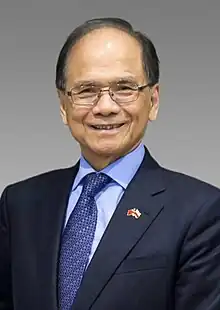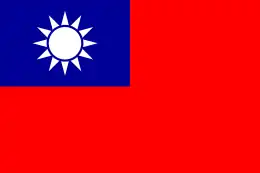You Si-kun
You Si-kun (Chinese: 游錫堃; born 25 April 1948[2]), also romanized Yu Shyi-kun, is a Taiwanese politician serving as a member and the president of the Legislative Yuan. He was one of the founding members of the Democratic Progressive Party (DPP), and is known to be a strong advocate of Taiwan independence.[3] He led the DPP as chairman from 2006 to 2007 and served as Premier from 2002 to 2005.[4]
You Si-kun | |
|---|---|
游錫堃 | |
 Official portrait, 2023 | |
| President of the Legislative Yuan | |
| Assumed office 1 February 2020 | |
| LY Vice President | Tsai Chi-chang |
| Preceded by | Su Jia-chyuan |
| Member of the Legislative Yuan | |
| Assumed office 1 February 2020 | |
| Constituency | Party-list |
| Chairman of the Democratic Progressive Party | |
| In office 15 January 2006 – 21 September 2007 | |
| Secretary General | Lin Chia-lung |
| Acting by | Chai Trong-rong (14 March 2007-8 May 2007) |
| Preceded by | Annette Lu (acting) |
| Succeeded by | Chen Shui-bian |
| 18th Premier of the Republic of China | |
| In office 1 February 2002 – 1 February 2005 | |
| President | Chen Shui-bian |
| Deputy | Lin Hsin-yi Yeh Chu-lan |
| Preceded by | Chang Chun-hsiung |
| Succeeded by | Frank Hsieh |
| Vice Premier of the Republic of China | |
| In office 20 May 2000 – 27 July 2000 | |
| Premier | Tang Fei |
| Preceded by | Liu Chao-shiuan |
| Succeeded by | Chang Chun-hsiung |
| Magistrate of Yilan County | |
| In office 20 December 1989 – 20 December 1997 | |
| Preceded by | Chen Ding-nan |
| Succeeded by | Liu Shou-ch'eng |
| Member of the Taiwan Provincial Assembly | |
| In office 20 December 1981 – 20 December 1989 | |
| Constituency | Yilan County |
| Personal details | |
| Born | 25 April 1948 Dongshan, Taipei County, Taiwan, Republic of China |
| Political party | Democratic Progressive Party (1984–present) |
| Other political affiliations | Chinese Youth Party (1966–1975)[1] |
| Spouse | Yang Pao-yu |
| Alma mater | National Chung Hsing University Tunghai University |
| You Si-kun | |||||||||||||||||||
|---|---|---|---|---|---|---|---|---|---|---|---|---|---|---|---|---|---|---|---|
| Traditional Chinese | 游錫堃 | ||||||||||||||||||
| Simplified Chinese | 游锡堃 | ||||||||||||||||||
| |||||||||||||||||||
Personal background
Born in Taihe Village (太和村), Dongshan Township, Yilan County, You was raised in a poor tenant farming family. While he was a 13 year-old student at Taiwan Provincial Yilan High School, his house was destroyed by flood waters during typhoon Pamela and his father died of tuberculosis in the same year. As a result, he quit junior high school to work full-time on his family farm.[5]
At 19, he enrolled in supplementary night school at Lotung Commercial and Vocational High School. He moved to Taipei to enroll in the supplementary Hsihu Commercial and Industrial High School. He studied international commerce at the Chihlee Institute of Technology (致理商專) and public administration at the National Chung Hsing University.[6] He graduated with a Bachelor of Arts in politics in Tunghai University in 1985 at the age of 37.[2]
Rise in politics
In 1981, he was elected a member of the Taiwan Provincial Assembly for Yilan County. You, Su Tseng-chang, and Hsieh San-sheng made the so-called "iron triangle" in the Assembly. The three were the only members ever to resign from the Assembly.[7][8]
From 1983 to 1984 he was the Tangwai Secretary-General. He became Convener of Tangwai National Election Backing Committee in 1986. As a founding member of the Democratic Progressive Party, he was a member of its Central Committee from 1984 to 1986 and its Central Standing Committee from 1986 to 1990 when he was elected the Magistrate of Yilan County, during which he was a member of the Educational Reform Committee of the Executive Yuan from 1994 to 1996. In his second term as magistrate, Environmental Protection (環保立縣), Tourism (觀光立縣), Information Promotion (資訊立縣), and Culture (文化立縣) were his four main goals in administration. After the completion of his two terms as magistrate in 1997, he was in 1998 appointed Chairman of the Taipei Rapid Transit Corporation by then Mayor Chen Shui-bian. He resigned in 1999 to become Secretary-General of the Democratic Progressive Party.[9]
He was the chief spokesman for the DPP campaign in the 2000 presidential election. With Chen Shui-bian's election to the presidency, he was appointed Vice Premier under Premier Tang Fei.[10]
In July 2000, four construction workers were trapped by the rising floodwaters of Pachang Creek. As local and central government authorities squabbled for three hours over who would send out a rescue helicopter, the men drowned. In the public outrage that ensued, officials up the chain of command, including Premier Tang, tendered their resignations. Vice Premier You, who was also chairman of the Committee of Disaster Relief and Prevention, had his resignation accepted.[11]
Six months later, You rejoined the administration as Secretary-General to the Office of the President and served until his promotion to the premiership on 1 February 2002.[12]
Premiership
As premier, You defended the administration's position on the peace referendum and promoted a NT$610.8 billion arms procurement package in 2004. He caused some minor controversy when he used the designation "Taiwan, ROC" on an official visit to Honduras. Chen later said he preferred "Taiwan." In September 2004, he directed the government to refer to the People's Republic of China in official documents as simply "China" as opposed to "mainland China" or "Communist China" as was previously done in order to highlight a "separate Taiwanese identity." This move was not endorsed by the Presidential Office and the Mainland Affairs Council clarified that it would only apply to internal documents.[13]
You and his cabinet resigned en masse following the pan-Green Coalition failure to gain a majority in the 2004 legislative elections. In the ensuing cabinet shuffle, You was returned to the presidential office as secretary-general and succeeded as premier by Frank Hsieh.[14]
On 15 January 2006 he was elected chairman of the Democratic Progressive Party with 54% of the vote.[15]
You was a candidate for the DPP nomination for the 2008 presidential election, competing against Frank Hsieh, Su Tseng-chang, and Annette Lu. He finished third in the first round of the primary and subsequently withdrew along with the other trailing candidates, paving the way for the leading candidate Hsieh to win the nomination without a need for a second round which would have been based on opinion polling.[16]
Corruption charges and acquittal
On 21 September 2007, You, along with Vice President Annette Lu and National Security Office secretary-general Mark Chen, were separately indicted on charges of corruption by the Supreme Prosecutor's Office of Taiwan.[17] You was accused of embezzlement and special fund abuse of about US$70,000. He resigned his post as chairperson of the Democratic Progressive Party later that day.[17] On 2 July 2012, all three were acquitted of all charges.[18]
2014 New Taipei City mayoralty election
On 29 November 2014, You lost the New Taipei City mayoralty election to his opponent Eric Chu of the Kuomintang.[19]
| 2014 New Taipei City Mayoral Election Result[20] | ||||||
|---|---|---|---|---|---|---|
| No. | Candidate | Party | Votes | Percentage | ||
| 1 | You Si-kun | 934,774 | 48.78% | |||
| 2 | Li Chin-shun (李進順) | 22,207 | 1.16% | |||
| 3 | Eric Chu | 959,302 | 50.06% | |||
Later political career
You was elected to the Legislative Yuan in 2020, securing an at-large seat on behalf of the Democratic Progressive Party.[21] He was elected President of the Legislative Yuan on February 1, 2020, defeating Kuomintang lawmaker Lai Shyh-bao and succeeding Su Jia-chyuan.[22][23] Speaking at the 2020 Taipei Traditional Chinese Medicine International Forum on July 5, 2020, You Si-kun suggested renaming Chinese medicine as "Taiwanese".[24]
Personal life
You is the founder of Kavalan Journal (噶瑪蘭雜誌), which is named after the Kavalan Taiwanese aborigines.[25]
He married Yang Pao-yu in 1978, with whom he has two sons. His mother, Huang Shou-chu, died in December 2002.[26]
References
- "游錫堃". Taiwan Provincial Consultative Council. Archived from the original on 22 December 2012. Retrieved 2 December 2012.
- "Yu Shyi-kun". Government Information Office. Archived from the original on 10 February 2012. Retrieved 2 November 2007.
- Wang, Chris (16 December 2013). "'Oral History' about DPP establishment launched". Taipei Times. Archived from the original on 20 September 2021. Retrieved 13 February 2021.
- "游錫堃委員". 立法院 (in Chinese). Taiwan. Archived from the original on 2 January 2022. Retrieved 2 January 2022.
- 甯其遠 (19 August 2021). "水牛伯專訪1/從求學到出社會 游錫堃人生「一直做大水」" (in Chinese). Taiwan. CTWANT. Archived from the original on 2 January 2022. Retrieved 2 January 2022.
- "7號 游錫堃". Liberty Times Net (in Chinese). Taiwan. Archived from the original on 2 January 2022. Retrieved 2 January 2022.
- 黃欣柏 (1 February 2020). "昔「省議會三劍客」僅存2人 近40年後分掌立院、政院" (in Chinese). Taiwan. Liberty Times Net. Archived from the original on 2 January 2022. Retrieved 2 January 2022.
- 曾盈瑜 (21 November 2019). "澄清與蘇貞昌沒心結 游錫堃:我們在省議會是鐵三角" (in Chinese). Taiwan. Apple Daily. Archived from the original on 2 January 2022. Retrieved 2 January 2022.
- "游錫堃 先生". 行政院全球資訊網 (in Chinese). Taiwan. Archived from the original on 2 January 2022. Retrieved 2 January 2022.
- "歷史上的今天/八掌溪風暴唐飛請辭獲慰留 游錫堃扛責去職" (in Chinese). Taiwan. 三立新聞網. 22 July 2020. Archived from the original on 2 January 2022. Retrieved 2 January 2022.
- "游錫堃:八掌溪事件4條人命我就下台了!" (in Chinese). Taiwan News. 4 September 2009. Archived from the original on 2 January 2022. Retrieved 2 January 2022.
- "副總統主持總統府新任秘書長游錫堃交接典禮". Office of President Republic of China (Taiwan) (in Chinese). Taiwan. 6 October 2000. Archived from the original on 2 January 2022. Retrieved 2 January 2022.
- 楊孟瑜 (20 August 2004). "台行政院長"台灣,ROC"言論引發議論" (in Chinese). BBC中文網. Archived from the original on 2 January 2022. Retrieved 2 January 2022.
- 楊孟瑜 (24 January 2005). "台灣內閣總辭改組" (in Chinese). BBC中文網. Archived from the original on 2 January 2022. Retrieved 2 January 2022.
- "Taiwan's top party picks new boss". BBC. 15 January 2006. Archived from the original on 16 June 2019. Retrieved 2 November 2007.
- "Frank Hsieh wins DPP primaries". The China Post. Taiwan. 7 May 2007. Archived from the original on 7 February 2012. Retrieved 2 November 2007.
- Jane Rickards (22 September 2007). "Taiwan's Vice President, 2 Others Charged With Corruption". The Washington Post. Archived from the original on 3 November 2012. Retrieved 2 November 2007.
- Huang, Yi-han; Chen, Ann (2 July 2012). "Former vice president found not guilty of special fund abuse". Central News Agency. Archived from the original on 26 July 2020. Retrieved 25 April 2020.
- Pan, Jason (30 November 2014). "Eric Chu survives with razor-thin majority". Taipei Times. Archived from the original on 20 September 2021. Retrieved 9 May 2020.
- "103年直轄市長選舉 候選人得票數". 中央選舉委員會 (in Chinese). Taiwan. Archived from the original on 3 June 2020. Retrieved 2 January 2022.
- Lin, Sean (13 January 2020). "2020 Elections: Yu Shyi-kun a popular choice for next speaker". Taipei Times. Archived from the original on 17 January 2020. Retrieved 13 January 2020.
- Chen, Chun-hua; Yeh, Joseph (1 February 2020). "DPP's You elected legislative speaker (update)". Central News Agency. Archived from the original on 1 February 2020. Retrieved 1 February 2020.
- Lin, Sean (2 February 2020). "DPP's Yu Shyi-kun elected legislative speaker". Taipei Times. Archived from the original on 1 February 2020. Retrieved 2 February 2020.
- "Taiwan legislative speaker suggests renaming Chinese medicine as 'Taiwanese'". Taiwan News. 7 July 2020. Archived from the original on 21 April 2021. Retrieved 20 April 2021.
- 王貝林 (10 April 2006). "《星期人物》政委林錫耀 政院幕後大推手" (in Chinese). Taiwan. Liberty Times Net. Archived from the original on 2 January 2022. Retrieved 2 January 2022.
- "Premier consoled following mother's death". Taipei Times. 8 December 2002. Archived from the original on 15 December 2019. Retrieved 9 July 2017.
